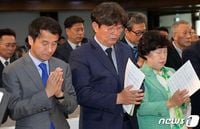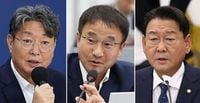On June 26, 2025, the Democratic Party of Korea (DPK) announced the designation of its candidates for several key vacant standing committee chairperson positions in the National Assembly, signaling a decisive move amidst ongoing deadlock with the opposition People Power Party (PPP).
The DPK named Rep. Lee Chun-seok, a seasoned four-term lawmaker, as chairperson of the Legislation and Judiciary Committee. Alongside him, Rep. Han Byung-do, a three-term legislator, was designated to lead the Special Committee on Budget and Accounts, while Rep. Kim Kyo-heung, also a three-term member, was appointed to chair the Culture, Sports and Tourism Committee. Additionally, it appears that Kim Byung-ki, the acting floor leader of the DPK, is expected to take charge of the Steering Committee.
These nominations come amid a tense stalemate between the ruling DPK and the main opposition PPP over the allocation of five vacant standing committee chair positions, including the Legislation and Judiciary, Budget and Accounts, Culture, Sports and Tourism, Steering, and Strategy and Finance Committees. The Strategy and Finance Committee chairmanship was allocated to the PPP as per an agreement reached during the first half of the 22nd National Assembly, leaving the DPK to claim the remaining four posts.
The DPK made clear its intention to formalize these appointments at a plenary session scheduled for June 27, 2025, the final day of the June extraordinary session that concludes on July 4. The party has urged the National Assembly Speaker Woo Won-shik to convene the session to facilitate the election process. Given the DPK's majority in the Assembly, it is widely expected that these nominees will be confirmed unless unexpected political shifts occur.
However, the road to this point has been fraught with political friction. The DPK and PPP have engaged in multiple rounds of negotiations—five meetings in total—over the redistribution of these influential committee positions but have failed to reach a consensus. The PPP insists that the Legislation and Judiciary Committee and the Budget and Accounts Committee should be chaired by the opposition to maintain checks and balances in the post-presidential election political landscape.
Conversely, the DPK has stood firm on its position, emphasizing adherence to the existing agreement that the current committee composition should remain intact until the first half of the 22nd National Assembly concludes, effectively a one-year extension. The DPK also stresses the urgency of promptly reviewing the government's second supplementary budget bill for the year, which requires the Budget and Accounts Committee to be fully operational.
Moon Jin-seok, the DPK's senior deputy floor leader, acknowledged the impasse but expressed the party's resolve: "While agreement is best, if unavoidable, we have no choice but to proceed with the election process for the Budget and Accounts Committee chairperson." This underscores the party's readiness to act unilaterally should the opposition remain intransigent.
The PPP has responded with strong opposition to the DPK's planned plenary session. Yoo Sang-bum, the PPP's senior deputy floor leader, stated, "It is difficult to cooperate with convening a plenary session when our demands for checks and balances within the National Assembly, such as the Legislation and Judiciary Committee or the Budget and Accounts Committee for the opposition, are not met." PPP spokesperson Park Sung-hoon further criticized the move, asserting that if Speaker Woo convenes the session at the DPK's request, it would represent a surrender of his neutrality as National Assembly Speaker.
This standoff reflects deeper political tensions between the two major parties. The PPP argues that the opposition's control of key committees is essential for oversight and balance, especially given the ruling party's dominance of the Assembly, the presidency, and the Speaker's office. The DPK, meanwhile, views the committee chairmanships as vital instruments for advancing its legislative agenda, including significant reforms such as amendments to the Commercial Act and other major policies under the Lee Jae-myung administration.
Notably, the DPK had previously acted unilaterally in the early days of the 22nd National Assembly by electing 11 standing committee chairpersons exclusively from its own ranks, setting a precedent for the current assertive approach. This history adds context to the present impasse and the party's readiness to proceed without opposition consent.
Beyond the political maneuvering, the DPK has emphasized the practical necessity of filling these committee seats to ensure the swift processing of the government's supplementary budget and other pending legislative matters. The Budget and Accounts Committee, in particular, plays a critical role in scrutinizing fiscal proposals, and its vacancy has been a significant hurdle.
Despite the PPP's refusal to submit a list of Budget and Accounts Committee members, the DPK has already submitted its nominations, signaling a unilateral push to move forward. National Assembly Speaker Woo Won-shik had earlier requested both parties to submit their respective committee member lists and the names of vacant chairpersons by June 26, underscoring the urgency of resolving the stalemate.
As the June 27 plenary session approaches, all eyes are on whether the PPP will relent or if the DPK will proceed to elect its nominees en masse. The outcome will not only shape the legislative agenda for the coming months but also reflect the broader dynamics of power and negotiation in South Korea's National Assembly.
Meanwhile, within the DPK, notable figures such as Kim Yong-min, a lawmaker who has been at the forefront of judicial reform efforts, have been designated to key roles, with Kim announcing on social media his appointment as an executive secretary for the Legislation and Judiciary Committee. This move highlights the party's focus on pushing its reformist policies through these strategically important committees.
In short, the Democratic Party's move to designate and push for the election of standing committee chairpersons marks a critical juncture in South Korea's parliamentary politics. It underscores the challenges of power sharing in a polarized environment and the strategic calculations parties make to advance their priorities. Whether this assertive approach will lead to legislative progress or deepen political gridlock remains to be seen, but one thing is clear: the DPK is prepared to wield its majority decisively.





